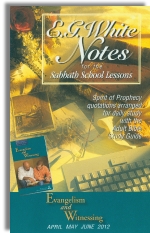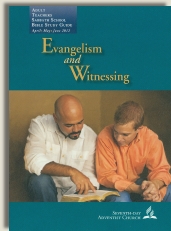|
||||||||||||||
Commentary on "Personal Evangelism and Witnessing"
Day 4: Tuesday, May 8, 2012 - My Personal Potential
Overview
In today’s lesson the authors primary concern is that Adventist members would not shy away from requests from personal ministry leaders for volunteers. The author uses the example of God calling Moses to Egypt and the fact that Moses resisted God’s calling because of his lack of confidence in his ability. The author writes that, “Each believer has tremendous potential to contribute to the Lord’s work.” The study concludes with a call for readers to ask God to examine their hearts and show them their “true condition” because heart “condition affects our potential.”
Observations
Before beginning I would like to remind you of a statement made in one of the quotes taken from Saturday concerning the markings of a false church:
a) Radical Exclusivism: “Radical Exclusivism is evidenced by those churches who claim that it is only in their denomination or tradition that salvation can be found. They have all the right answers, right practices, and right ordinances/sacraments. Once this is claimed then the institution itself becomes the determining factor of salvation.”
While today’s lesson doesn’t deal with salvation, the concept of Seventh-day Adventism being radically exclusive helps to shed light on the fact that Adventist leadership holds a type of nondescript, allusive power over the lay people. One manifestation of this power is in the way lay people allow their leaders to determine the specific work that God needs done. With the great mission of spreading the 3 angels message through out the world, and an international General Conference which oversees the official work of the organization as well as the allocation of funds for ministry, most lay people rely on the words of their local leaders to let them know where “God needs them”… and their money. When local pastors inform their congregations of specific needs there is a sense that God is calling them to obey trusted leaders no matter how unfit or uncalled for the job they may feel. It is a loyal response to the larger mission and is considered to be a response to God.
In today’s lesson we see another misuse of scripture to manipulate believers into volunteering for the specific needs and tasks of local congregations. In today’s commentary we will take a close look at the first sentence in the study and examine it against the story of Moses. We will then look at how SDA prophetess (lead by their spirit of prophesy) taught lay people to esteem the General Conference.
Now, lets examine the first statement made by the author:
“When our personal ministries leaders call for volunteers to be involved in witnessing and evangelism, we often think that many people are more qualified and gifted than we ourselves are.”
Who is Calling? “…our (SDA) personal ministry leaders…”
For What Purpose? Volunteers for witnessing & evangelism
Witnessing What? “God raised up this church to proclaim 'present truth,’ the three angels messages of Revelation 14:6-12.” Joe A. Webb
Let’s look at the context of the passage of scripture used to motivate members to respond to their local church needs:
Who is Calling? “And he said, “I am the God of your father, the God of Abraham, the God of Isaac, and the God of Jacob…I have sent you…” (Ex. 3:6, 12)
For What Purpose? “and I have come down to deliver them out of the hand of the Egyptians and to bring them up out of that land to a good and broad land, a land flowing with milk and honey, to the place of the Canaanites, the Hittites, the Amorites, the Perizzites, the Hivites, and the Jebusites… Come, I will send you to Pharaoh that you may bring my people, the children of Israel, out of Egypt.” (Ex. 3:8,10)
Witnessing What? “ Go and gather the elders of Israel together and say to them, 'The Lord, the God of your fathers, the God of Abraham, of Isaac, and of Jacob, has appeared to me, saying, 'I have observed you and what has been done to you in Egypt, and I promise that I will bring you up out of the affliction of Egypt to the land of the Canaanites, the Hittites, the Amorites, the Perizzites, the Hivites, and the Jebusites, a land flowing with milk and honey.’” (Ex. 3:16-17)
It was God who called Moses to do the work He had designed for him before the foundations of the Earth. Scripture clearly teaches that our Father not only calls and equips us, but He also wills us to do His good pleasure (Phil. 2:13)! When we “will” to do something, we “desire” to do it. It is not a decision we come to as a result of manipulation or guilt, but rather it is an energized longing put in our hearts by God for the purpose of what He has called us to do. It is clearly true that Moses had no desire to go to Egypt, but again context is deeply important. Moses was an Israelite under the old covenant between God and Israel. We are not Israel, we are something completely new and different. We are the church and God indwells His church. Therefore, when we read that it is God who works in us, we are reminded of the beautiful gift of the resurrection life of Christ and what that means for those who are His! It also means that God will let His children know where He wants them, we do not need to wait for word from religious leaders.
For the sake of clarifying the context of this passage a bit further we should remember that Moses was not a type of the body of Christ. Moses was a type of Christ. He was sent by God to manifest the work of His redemption for the people of Israel. That is why we read in Duet. 18:15 that;
“The Lord your God will raise up for you a prophet like me from among you, from your brothers—it is to him you shall listen—”
The scriptural type for the body of Christ is found in Ephesians 5:22-33 where Paul writes to the church concerning marriage and concludes by saying,
“ This mystery is profound, and I am saying that it refers to Christ and the church.” (Eph. 5:32)
In this section of scripture we are taught to submit to the Lord Jesus and Him alone. I do not believe it’s a stretch to say that submitting to anything or anyone other than the Lord Jesus is spiritual adultery. God gives us instruction on how to live out our new identity in Christ through the completed inspired scriptures written for the church. We do not need anything more (including prophets, extra-biblical writings, or man made committees) to look to in order to know what God’s will is for the believer. It is absolutely true that ALL scripture is inspired and useful for teaching and instructing. However, we must be careful to keep it within it’s context.
With that being said, one of the lessons we can draw from Moses is that God assigns the work! We do not contact God and tell Him, “This is the work I intend to do. Please give me your power to accomplish it.” It is not for man to determine God’s work for himself or for other believers!
In concluding the lesson the author encourages the readers to ask God to examine the condition of their hearts because the condition of their hearts will affect their own potential. On the one hand, the author asserts that it is God who empowers us to do His work, and on the other hand it is the condition of our heart that determines our potential. I would like to suggest that our only potential is failure. It is God in us who succeeds in His purposes for our lives and He is only able to dwell within us following our new birth. For more on the new birth see Sunday’s commentary.
I would like to conclude today’s commentary by sharing a quote from Ellen G. White that will expose the high claim to power that the General Conference holds tightly to. Interestingly enough, Ellen G. White seems to change her mind concerning the following statement in later years, which is alarming when you notice that she begins her statement by declaring that she was “shown” this truth in vision;
"I have been shown that no man’s judgment should be surrendered to the judgment of any one man. But when the judgment of the General Conference, which is the highest authority that God has upon the earth, is exercised, private independence and private judgment must not be maintained, but be surrendered." 3T p. 492.
It would appear that the papal authority of one man, so despised within Adventism, was replaced by a cabinet authority of several men. Whether the agency is one man or many, to claim that the believer is under the authority of anyone other than God Himself is to deny the work of Christ!
Summary Points
- Today’s lesson continues to display the radical exclusivism of Seventh-day Adventism.
- A call for volunteers by local Adventist leadership is in no way relatable to the call of Moses by God.
- The General Conference is not God’s highest authority that God has on earth and to say so is blasphemy!
Copyright 2012 BibleStudiesForAdventists.com. All rights reserved. Revised May 1, 2012. This website is published by Life Assurance Ministries, Camp Verde, Arizona, USA, the publisher of Proclamation! Magazine. Contact email: BibleStudiesForAdventists@gmail.com.
The Sabbath School Bible Study Guide and the corresponding E.G. White Notes are published by Pacific Press Publishing Association, which is owned and operated by the Seventh-day Adventist church. The current quarter's editions are pictured above.
Official Adventist Resources
Standard Edition Study Guide Week 6
Teacher's Edition Study Guide Week 6
Easy Reading Edition Study Guide Wk 6
Search the Complete Published Ellen G. White Writings
Please Support This Project


